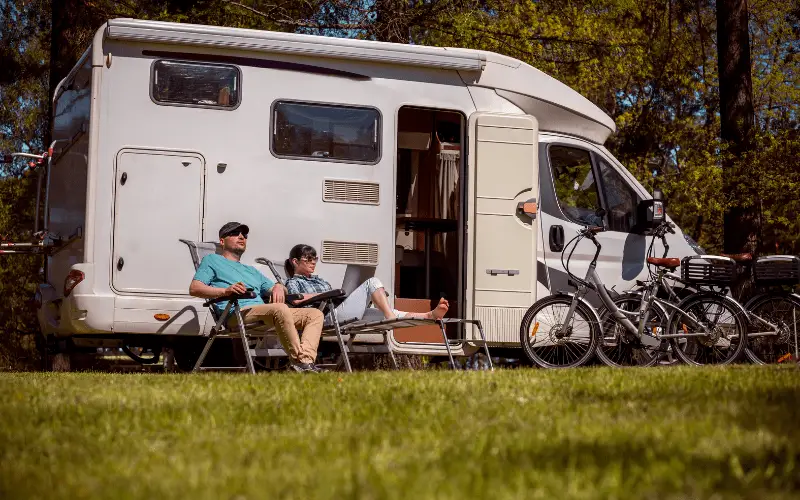Published Date: September 5, 2020
Last Updated on June 22, 2023 by Camper Front
Can I live in a motorhome on my own land? Well, that’s both a yes and no; living in a Motorhome on your own land is not illegal.
In fact, living in a Motorhome is way cheaper and comes with less stress compared to traditional homes. Still, there are many rules, regulations, and considerations you must understand before thinking of going full-time in a Motorhome.
But If you’re planning to live in it full-time, you might be breaking the law because, even if the land is yours, some laws still prohibit you from using it to house a Motorhome permanently.
Table of Contents
Can I Live in a Motorhome on My Own Land?
Legally, you can live in a motorhome on your land for 28 days in twelve months without having to seek governmental permission, provided that services like main utilities such as gas, electricity, water, and sewage are not hooked-up.
To live in your motorhome permanently, you would need to acquire planning permission to do so. If you plan on using your motorhome in conjunction with the main house, like in the garden, backyard, or garage, then you don’t need to get planning permission.
But most times, your Motorhome might be too big to stay in your driveway, and even if it does, simply pulling up on your driveway raises a lot of issues like waste disposal, the postal address, rates, and insurance.
Living on an empty land

Finding empty land in an area that is zoned for recreational vehicles might not be the easiest thing you will do. This is because the safest and most conveniently located properties often exist in areas that are not zoned for recreational vehicles.
This means that your dream area might just not allow RV living, which is a big bummer. But that shouldn’t discourage you; there are lots of places zoned for RV living that are also beautiful; it might just take you some time to find.
So when looking for a spot for your RV, you want to look out for areas that are safe, reasonably affordable, properly zoned, and, most important of all, well located. Here are some safety precautions you should follow when scouting for land for your Motorhome.
- Properly learning and understanding the zoning laws of the area where you intend to live.
- Doing ground research on the local population and their culture.
- Learning about the availability and expertise of local medical facilities and security personnel
- Lastly and most importantly, you have to invest in self-protection.
You also need to check if the land is suitable for development, for example, you are definitely going to need
- Potable water.
- The ground should be able to support a septic system.
- Easily accessible road network.
- Availability of electricity.
- Availability of network and phone services.
If anyone of these items is missing, the land will not be worth owning because access and utilities are essential for comfortable living.
Now you really don’t have to move out of a town you love into a place you barely know anyone, or if you love having neighbors around, there are a lot of ways to work around it and live in your Motorhome in a city, but there are things you should know.
Zoning laws
First, check the state laws governing your place of residence. Is there anything saying you can’t live in your Motorhome on your property? If all is clear on the state level, then you have to go ahead and check the county and local ordinances.
Does your county have any laws against living full-time in your Motorhome? What about your town? You want to make sure you are clear to stay in your Motorhome at every level because even if you try to be sneaky, one call from a nosey neighbor might get you a lot more than you bargained for.
So go through all the steps and procedures, and in the end, trust me, it’ll be worth it.
Conclusion
Can I Live in a Motorhome on my own land? This is a question that has plagued the minds of many RVers who finally decide to “settle down” and live full-time in a particular place.
It’s not as complicated as it may seem, but it does require some legal and intellectual work. Make sure to follow all the laid down regulations and restrictions to avoid having a run-in with the law.

